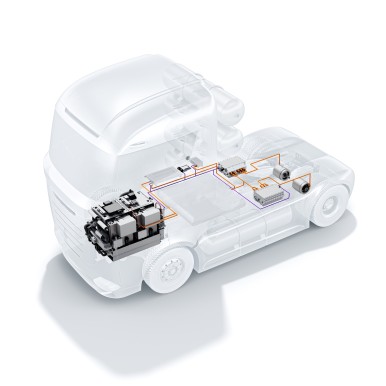- Innovative Bosch technology reduces CO2 emissions in all segments - The most efficient engines in today's compact class are already 2020-compliant - CNG engines save money and help protect the environment Stuttgart/Vienna – Bosch, the global supplier of technology and services, is confident that the EU fleet emissions targets of 95 grams of CO2 per kilometer are technically feasible. “We are working on innovative solutions with the aim of further improving engines across vehicle classes. Further reductions in fuel consumption are possible, but will involve considerable additional costs in some cases,” said Dr. Volkmar Denner, the chairman of the board of management of Robert Bosch GmbH with special responsibility for research and development, at the Vienna Motor Symposium 2013. “From a Bosch viewpoint, it is essential that the further development of the powertrain be regarded from a cost-benefit perspective.” In all vehicle segments, Bosch sees technical potential for reducing CO2 emissions even further, thus protecting the environment and conserving resources. Even today, compact cars equipped with the latest technology meet the EU targets. The most advanced diesel in this segment emits just 81 grams of CO2 per kilometer. Its gasoline counterpart manages 99 grams of CO2 per kilometer. In compact cars, the emissions targets for 2020 are within striking distance, and in some cases already reality. Improvements to engines can reduce fleet values further. Especially in the middle class, price is an important criterion. This is why Bosch is also working to make engines in this segment even cleaner and more efficient, but at the same time affordable. This calls for new components. For example, there are systems that can effectively recuperate braking energy, allowing a mild electrification of the powertrain. Even in the middle class, therefore, further efforts will allow the very ambitious EU target for 2020 to be met: modern diesel engines in this class now emit 105 grams of CO2 per kilometer, and modern gasoline engines 115 grams of CO2 per kilometer. Plug-in hybrid systems further enhance premium segment For many automakers, these developments in compact and middle-class vehicles make sense. The more economical a vehicle fleet's high-volume compact models are, the better they can offset the emissions from SUVs. In the premium class, simply optimizing the internal-combustion engine is no longer enough for reaching CO2 targets. Additional savings can be achieved by further reducing drag and weight. At the same time, the automotive supplier Bosch is developing efficient plug-in hybrid systems that make it possible to drive up to 60 kilometers purely on electricity. Using systems such as these, even an SUV can reduce its emissions. However, this will also mean that this vehicle class will cost more. On the other hand, the plug-in hybrid offers extra functions that further enhance the premium segment. A car equipped with this powertrain is almost silent when driven electrically, but nonetheless has the same range as a car with a combustion engine. And the torque of the second, electrical powertrain provides a boost effect, making the car more fun to drive. In addition to powertrain electrification, Bosch sees potential for installing economical CNG engines in all vehicle classes. “CNG systems can already help reduce CO2 at a low additional cost. In this area, Bosch components have a technical edge,” Denner said. “However, in order to increase the market penetration of CNG vehicles, the infrastructure has to be significantly expanded.” As the world's leading automotive supplier, Bosch offers a broad range of systems and components that contribute to conserving resources and increasing energy efficiency. With sales of 31.1 billion euros in 2012, the Automotive Technology business sector accounted for 59 percent of Bosch's total sales. The business sector counts 177,000 associates worldwide, of which 33,000 are development engineers. Automotive Technology is the largest Bosch Group business sector. In 2012, its sales came to 31.1 billion euros, or 59 percent of total group sales. This makes the Bosch Group one of the leading automotive suppliers. Its roughly 177,000 Automotive Technology associates worldwide mainly work in the following areas of business: injection technology for internal-combustion engines, alternative powertrain concepts, efficient and networked powertrain peripherals, systems for active and passive driving safety, assistance and comfort functions, technology for user-friendly infotainment as well as car-to-car and Car2X communication, and concepts, technology, and service for the automotive aftermarket. Bosch has been responsible for important automotive innovations, such as electronic engine management, the ESP® anti-skid system, and common-rail diesel technology. The Bosch Group is a leading global supplier of technology and services. In fiscal 2012, its roughly 306,000 associates generated sales of 52.5 billion euros. Since the beginning of 2013, its operations have been divided into four business sectors: Automotive Technology, Industrial Technology, Consumer Goods, and Energy and Building Technology. The Bosch Group comprises Robert Bosch GmbH and its roughly 360 subsidiaries and regional companies in some 50 countries. If its sales and service partners are included, then Bosch is represented in roughly 150 countries. This worldwide development, manufacturing, and sales network is the foundation for further growth. Bosch spent some 4.8 billion euros for research and development in 2012, and applied for nearly 4,800 patents worldwide. The Bosch Groups products and services are designed to fascinate, and to improve the quality of life by providing solutions which are both innovative and beneficial. In this way, the company offers technology worldwide that is “Invented for life.” Further information is available online at www.bosch.com and www.bosch-press.com.
Having established a regional presence in 1906 in North America, the Bosch Group employs 34,700 associates in more than 100 locations, as of December 31, 2020. According to preliminary figures, Bosch generated consolidated sales of $13.1 billion in the U.S., Canada and Mexico. For more information, visit www.bosch.us, www.bosch.ca and www.bosch.com.mx.
The Bosch Group is a leading global supplier of technology and services. It employs roughly 394,500 associates worldwide (as of December 31, 2020). According to preliminary figures, the company generated sales of $87.1 billion in 2020. Its operations are divided into four business sectors: Mobility Solutions, Industrial Technology, Consumer Goods, and Energy and Building Technology. As a leading IoT provider, Bosch offers innovative solutions for smart homes, Industry 4.0, and connected mobility. Bosch is pursuing a vision of mobility that is sustainable, safe, and exciting. It uses its expertise in sensor technology, software, and services, as well as its own IoT cloud, to offer its customers connected, cross-domain solutions from a single source. The Bosch Group’s strategic objective is to facilitate connected living with products and solutions that either contain artificial intelligence (AI) or have been developed or manufactured with its help. Bosch improves quality of life worldwide with products and services that are innovative and spark enthusiasm. In short, Bosch creates technology that is “Invented for life.” The Bosch Group comprises Robert Bosch GmbH and its roughly 440 subsidiary and regional companies in 60 countries. Including sales and service partners, Bosch’s global manufacturing, engineering, and sales network covers nearly every country in the world. The basis for the company’s future growth is its innovative strength. At 126 locations across the globe, Bosch employs some 73,000 associates in research and development, as well as roughly 30,000 software engineers.
Additional information is available online at www.bosch.us, www.iot.bosch.com, https://us.bosch-press.com, https://twitter.com/BoschPress
Exchange rate: 1 EUR = 1.2171





